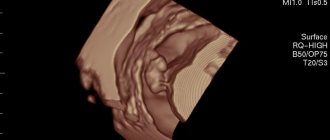During the entire period of pregnancy, the human embryo undergoes multiple changes and, as a result, from two fused cells of the parents in 9 months it becomes a full-fledged representative of humanity. Every day, every week, the fetal body increases in weight and height.
The science of embryology deals with the processes of formation and development of the fetus after conception and before birth. The obstetric gestational age begins counting from the last menstrual period of the parent. The embryonic period is counted from the moment of fertilization.
How does the human embryo develop?
Embryo at 1-2 weeks of pregnancy
In the first days, the follicle matures, from which the egg appears. It moves along the fallopian tube, where it meets the sperm. Fertilization occurs in which the 23 chromosomes of the egg combine with a similar number in the sperm. The sex of the unborn child depends on the presence of an X or Y chromosome in a male cell. Further along the course, the genome of the embryo is formed. On day 5, the embryo is ready to move into the uterus. There are cases when, after fertilization, the egg does not have time to reach the uterus, then an ectopic pregnancy occurs. Having reached the uterine region, the gastrula, which has transformed from the blastula, attaches to the walls. On day 9, the cells form a three-layer structure. As a result, the nervous system and skin will be formed from the outer layer. The middle layer will form the musculoskeletal system, muscles, blood vessels, internal organs, etc. The inner layer will create the cavity of the gastrointestinal tract. In the middle of the second week, a pregnancy test can already give a positive effect.
Embryo at 3 weeks of pregnancy
At week 3, cell division and growth into the uterine wall continues. At the same time, the formation of the umbilical cord and placenta begins, and amniotic fluid appears in the amniotic area. The size of the embryo reaches 4 mm.
Embryo at 4 weeks of pregnancy (1 month)
During this period, the heart begins to pump blood throughout the fetal body. The creation of the brain, spinal and head, from the neural tube begins. In addition, the initial stage of internal organs, eyes and limbs is formed. Nutrients were initially consumed from the yolk sac, and future reproductive cells also float in the yolk. From the end of the month, the functions of the pouch gradually weaken, and eventually it disappears.
Embryo. 5 weeks from fertilization
The fruit size is up to 2.5 mm and weighs 0.4 g. The development of the nervous system continues, sections for the stomach, brain, lungs, and trachea appear. The circulatory systems are expanding. At the same time, the mother develops drowsiness, nausea, and odor intolerance - the main signs of toxicosis.
The body's systems are rapidly developing: the neural tube is improving, future parts of the brain, lungs, stomach, trachea are being distinguished, blood vessels are growing. At this moment, the woman experiences signs of toxicosis: nausea, drowsiness, intolerance to certain odors.
Embryo. 6 weeks from fertilization
The embryo here looks like a “fry”. Its size is up to 6 mm. The brain is divided into hemispheres. The heart already has two chambers. It is already pumping blood, which is enriched with nutrients and oxygen. Limbs are forming. The excretory, respiratory, and digestive systems are formed. The placenta is formed, and amniotic fluid is around the embryo. The baby can already move in the shell. Pigment is acquired in the retina.
Embryo at 7 weeks of pregnancy
At this stage, the size of the embryo can reach 13-15 mm. Gaps appear between the fingers, although they are practically not developed. The head increases in size. Its body still has an arched shape, with a “tail” remaining on the pelvic part. The baby's breathing and nutrition come from the mother's blood. The pregnant woman’s belly is not yet visible, but urination becomes frequent due to an excess of fluid in the body.
Embryo 8 weeks
The dimensions are already about two centimeters. The face already looks like a human one - eyes, ears, lips and nose are distinguishable. The rudiments of the lungs, the digestive system, the heart, and the brain with two hemispheres have already been formed. Almost all the most important things have been formed. The bones are still in the form of cartilage.
How you feel
At this time, you will not notice any changes in your condition, it is too early, and many do not even realize that they are pregnant, because not a single menstrual cycle has been missed yet.
You may only experience sensations characteristic of the ovulation period:
- Mild cramps and short-term nagging pain in the lower abdomen;
- Increase in the number of discharges;
- Change in the nature of the discharge (they become more viscous and sticky);
- Pain in the mammary glands.
You may also feel slightly unwell. Frequent symptoms are weakness, drowsiness and fatigue.
Embryo 10 weeks
At the end of the 10th week, the size will be about 4 cm. The eyelids will close before the eyes; the baby will be able to open them himself at 7 months. The respiratory system is almost ready for use. The rudimentary tail disappears, and buttocks form in its place. The baby moves freely inside the uterine area.
The skeleton and its structure fully correspond to a person. The arms and legs become longer to the appropriate proportions. But the head will occupy almost half the length of the body. This is explained by the active development of the cerebral hemispheres, the cerebellum is growing. The external genitalia develop according to gender. You will soon find out if he or she is growing in your belly. The baby's blood acquires its own group and Rh factor.
The miracle of the origin of life
A tiny person has already appeared in your life, although you may not know about it yet. In the Russian language there are terms “embryo”, “embryo”, “fetus”, but, unfortunately, there is no warm, kind word that would designate a person in the period when his life begins and the most incredible speed of development occurs. This word is sometimes so lacking to express love, tenderness, all the most important and valuable things that come into the world with the birth of a child. After thinking, we decided to call the growing little man from the beginning of life until the moment he is born, Baby . That's right, with a capital letter. Once born, he will certainly become just a baby (baby, small, doll), cute and charming. In the meantime, our Baby is the main character to whom these pages are dedicated.
So, from the moment the two cells merge, the Baby will have to solve a very important life task - to form, grow and gain strength for an independent life. The pace of its development over nine months is so great that it is impossible to surpass it after birth!
Science still has little information about the life of a child before birth, and every mother (and often father) wants to know as much as possible about her Baby. For what? To turn 280 days into an extraordinary adventure full of love and amazing discoveries, in which everything is important and everything has meaning.
Among all the miracles in the world, the miracle of the appearance of a new life remains the most amazing and mysterious. Who are you, little man? What can I do for you to make you feel good and comfortable from the very first moments of your life until birth? How to make your arrival into the world a holiday? We tried to answer even those questions that you may not have asked yourself yet.
Embryo 11 - 13 weeks
During this period, the expectant mother undergoes many different studies: ultrasound screening, ultrasound at 12 weeks of pregnancy. Screening allows you to identify various pathologies, abnormal structure of the body and organs, chromosomal abnormalities, etc. An ultrasound examination will give a 100% result in determining the sex of the child. The pancreas and liver are able to form secretions, the head is still disproportionate, and the child develops a thumb sucking reflex. The size of the fruit reaches 12-15 cm, weight - about 50 grams. All organs are formed, resistance to negative factors has appeared. The mother experiences heartburn, constipation and bloating instead of toxicosis.
Good to know
What is hCG?
Pregnancy tests: fortune telling on coffee grounds or “a shot on target”?
Signs of pregnancy, accurate and not so accurate: test, ultrasound, delay and others
The first signs of pregnancy in the early stages
What affects conceiving a child? 8 “don’ts” when planning a pregnancy
Do you want a boy or a girl? Is it possible to plan the gender of the child?
All texts for pages about mother and baby were kindly provided by RAMA Publishing - these are chapters from the book by Svetlana Klaas “Your Favorite Little Man from Conception to Birth”, reviewer Irina Nikolaevna Kononova, Candidate of Medical Sciences, Associate Professor of the Department of Obstetrics and Gynecology of the Ural State Medical Academy (Ekaterinburg).
Embryo 16 weeks - 19 weeks
During these three weeks, the fetus will noticeably increase in size and will be 22 cm in height, 240 g. in weight. During this period, the entire body will be covered with vernix lubrication, the glands begin to produce hormones, and the skeleton becomes much stronger. The lower part of the fruit begins to grow faster than the upper, that is, the proportions are equalized. Sex cells are formed in girls. This week may be accompanied by the first fetal movements. They won't be active at first, so don't worry if you don't feel your baby all the time.
Recommendations for the expectant mother
To ensure optimal conditions for the life born in your body, it is recommended to follow some rules:
- try to maintain a daily routine. A pregnant woman needs to get enough sleep to fill her body with strength for the painstaking work of creating a new person. You should sleep at least 8 hours a day;
- avoid harmful foods. The correct diet of a pregnant woman is an important component in the process of embryo formation. With food, the expectant mother replenishes the missing elements in the body, ensuring not only the development of the unborn child, but also protecting her own body from exhaustion. Nature provides an option when a sufficient amount of vitamins and minerals does not enter the female body with food. In this case, the body will take them from the pregnant woman’s reserves, which will immediately affect the condition of the woman’s skin, hair, nails and general well-being;
- to refuse from bad habits. Alcohol, active or passive smoking, consumption of harmful foods should be completely avoided;
- do not overwork, avoid heavy physical labor. A new life is developing in your body, allow your body to direct all its strength to this process;
- reduce the load on sports training. It is advisable for active mothers to avoid strength training and grueling activities. Most gynecologists agree that the best sports activities for a pregnant woman are swimming and yoga. But always focus on how you feel. If you have always been involved in some kind of sport and do not want to change it, then simply reduce the intensity;
- do not lift heavy objects. When you pick up a heavy object, you tense your abdominal muscles. In the 3rd obstetric week of pregnancy, this can provoke spontaneous miscarriage;
- avoid crowds of people. This recommendation will help you reduce your risk of disease;
- an illness that requires treatment, especially with antibiotics, can negatively affect the development of the embryo;
- avoid stress. Cortisol and adrenaline, which are released during stress, can negatively affect your well-being and the condition of the fetus.
Feelings in the third week of pregnancy
First of all, at this time there is a change in the psycho-emotional state of the woman. This manifests itself in different ways. Some women become very calm, they are satisfied with everything, and a feeling of stability and satisfaction appears. For others, on the contrary, everything falls out of hand, they are irritated, feel constant anxiety, and experience causeless anxiety.
In both cases, the changes are caused by sudden hormonal changes in the body, which is being rebuilt from its normal state to the state of pregnancy.
Emotional changes can be accompanied by physical changes. Due to fluid retention in the body, edema may occur. Also during pregnancy, a decrease or increase in appetite is often noted.
Approved medications
Separately, we need to talk about medications that the expectant mother is forced to take on an ongoing basis.
- Be sure to consult with your doctor about the possibility of continuing treatment with your chosen medications during pregnancy.
- Be sure to make sure that medications prescribed before pregnancy have no contraindications for taking while pregnant.
Do not prescribe treatment for yourself; take all medications strictly as prescribed by your doctor.
Sex
During the 3rd week of pregnancy, sexual activity is not prohibited. The main condition is mutual desire.
In some women, due to the appearance of symptoms similar to the onset of menstruation, there is a significant decrease in attraction to the opposite sex. In such a situation, you need to talk with the father of your unborn child, explain that this is due to changes taking place within you and does not affect your attitude towards him. Don't force yourself to do something you don't want to do.









